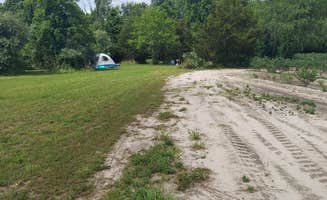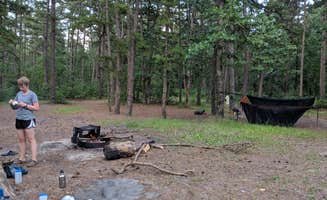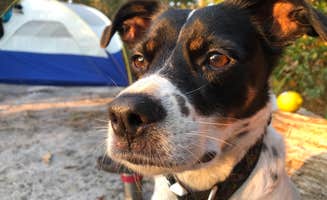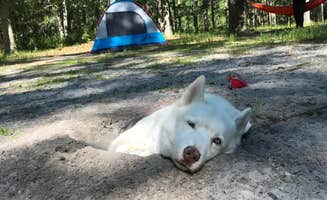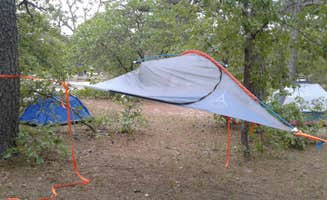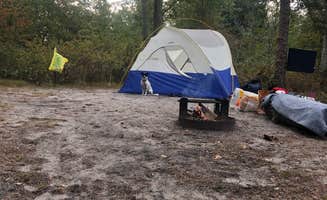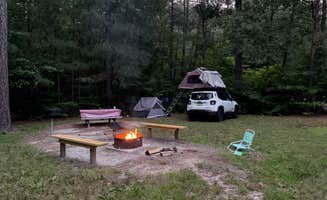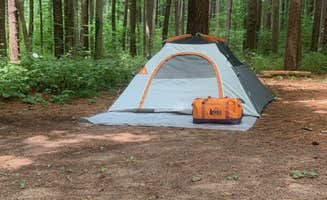Wharton State Forest dominates the tent camping landscape near Woodbine, New Jersey, with several primitive campgrounds situated within the 122,000-acre Pine Barrens region. The forest's elevation ranges from 50-200 feet above sea level, with seasonal temperature fluctuations from winter lows around 20°F to summer highs reaching 90°F. The region's acidic, sandy soil supports unique vegetation including pitch pines and scrub oaks that create a distinctive camping environment.
What to do
Kayaking the tannic waters: The Mullica River and connecting waterways provide excellent paddling opportunities. At Goshen Pond — Wharton State Forest, visitors can "put our kayaks in right next to the site which was very convenient. It's also a 5 minute drive from Atsion lake, a great place for kayaking and swimming."
Hiking the Batona Trail: Access the 50-mile trail directly from several campgrounds. At Batona — Wharton State Forest, "trailheads begin directly from campsites. Trails vary in length but all are flat and easily accessible." The Batona Trail offers a continuous route through the forest's most scenic sections.
Fishing for native species: The forest's lakes and rivers support multiple fish species. At Bodine Field Campground, one camper noted it's "a quick drive Harrisville Pond which mine as well be a lake. Good fishing for pickerel as well as a decent trail that goes around the entire pond."
What campers like
Solitude during off-peak times: Weekday and off-season camping offers greater seclusion. At Bodine Field — Wharton State Forest, "During the off season is in and during the week, it's very peaceful and awesome place to be. During the weekend it's very populated and tends to be pretty noisy."
Riverside campsites: Many sites provide direct water access. At Mullica River — Wharton State Forest, sites are accessible via "hike-in or boat-in only, no car access," and "Batsto River provides plenty of water for filtering--don't be weirded out by the brown color caused by tannins."
Walk-in camping experience: Vehicle-free camping areas reduce noise. Some campers appreciate that at Goshen Pond, "I like campgrounds which have you park off and walk in to your site. There is more foot traffic, but you don't hear as many cars coming and going and driving past your site all the time."
What you should know
Seasonal water access: Water availability varies throughout the year. At Batona Campground, "A water pump provides fresh water but is not available in the winter."
High tick population: The Pine Barrens ecosystem harbors abundant ticks. At Mullica River — Wharton State Forest, a camper warns, "NOTE: There are LOADS of ticks in this area," while another camper mentions Goshen Pond requires visitors to "check often for chiggers and ticks."
Limited bathroom facilities: Most campgrounds offer only basic sanitation. At Bodine Field, expect "Potable water is available along with a couple Porta potties," while the Mullica River campground has "2 outhouses (hold your breath)."
Wildlife encounters: Bears frequent certain camping areas. At Batona Campground, "Bears frequent this campground so be bear aware and practice proper food storage."
Tips for camping with families
Jersey shore proximity: Coastal camping provides beach access. At Shellbay Campgrounds, families appreciate being "within biking distance of the beaches at Stone Harbor, Wildwood, and Cape May," making it ideal for mixed camping and beach activities.
Pool access at developed campgrounds: Some private campgrounds offer swimming facilities. Shellbay Campgrounds provides "days by the pool or at the beach," with one camper remembering their "excitement to go camping, meet other kids at the campground, and have plenty of things to do close by (beach, shopping, swimming pool)."
Consider noise levels: Weekend camping can be louder, especially at popular sites. At Bodine Field, campers noted "3 boy scout troops of screaming children didn't make it enjoyable," while another mentioned some Shellbay sites had "several sites were playing music until 11:00 every night."
Tips from RVers
Sand road accessibility: Some forest roads present challenges for larger vehicles. Batona Campground access requires navigating "about 1 mile of loose sand. It can be accessed by a standard vehicle," but "A larger RV would not fit."
Primitive RV accommodations: Few forest campgrounds offer hookups. At Red Wing Lakes, RVers can find "electric, water and sewer hookups" while enjoying amenities like a "Swimming lake catch and release lake sells wood has bath houses."
Site selection for vehicle size: Choose campgrounds based on access roads and site dimensions. At Batona Campground, "Sites are suitable for tents or small campers. The unpaved road into the site is narrow and tree lined."


